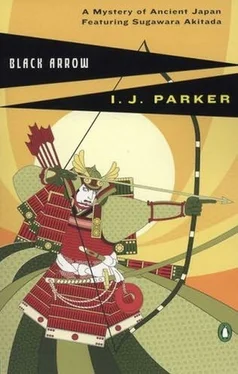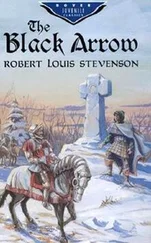I. Parker - Black Arrow
Здесь есть возможность читать онлайн «I. Parker - Black Arrow» весь текст электронной книги совершенно бесплатно (целиком полную версию без сокращений). В некоторых случаях можно слушать аудио, скачать через торрент в формате fb2 и присутствует краткое содержание. Год выпуска: 2006, ISBN: 2006, Издательство: Penguin, Жанр: Исторический детектив, на английском языке. Описание произведения, (предисловие) а так же отзывы посетителей доступны на портале библиотеки ЛибКат.
- Название:Black Arrow
- Автор:
- Издательство:Penguin
- Жанр:
- Год:2006
- ISBN:9780143035619
- Рейтинг книги:5 / 5. Голосов: 1
-
Избранное:Добавить в избранное
- Отзывы:
-
Ваша оценка:
- 100
- 1
- 2
- 3
- 4
- 5
Black Arrow: краткое содержание, описание и аннотация
Предлагаем к чтению аннотацию, описание, краткое содержание или предисловие (зависит от того, что написал сам автор книги «Black Arrow»). Если вы не нашли необходимую информацию о книге — напишите в комментариях, мы постараемся отыскать её.
Black Arrow — читать онлайн бесплатно полную книгу (весь текст) целиком
Ниже представлен текст книги, разбитый по страницам. Система сохранения места последней прочитанной страницы, позволяет с удобством читать онлайн бесплатно книгу «Black Arrow», без необходимости каждый раз заново искать на чём Вы остановились. Поставьте закладку, и сможете в любой момент перейти на страницу, на которой закончили чтение.
Интервал:
Закладка:
Before Akitada could ruminate on Takesuke’s insistence of pushing his guard on him, Uesugi returned to his own topic. “The office of high constable has been in Uesugi hands for generations,” he pointed out. “Without assigning blame to the many talented gentlemen from the capital who have served as governors here, serious matters have, as a rule, had to be resolved by the high constable. Our honorable governors from the capital have been most grateful to be relieved of onerous and dangerous duties.”
Kaibara, flushed with wine, gave a short bark of laughter. “And how! Most of them saw no need to spend the long winters here. They paid extended visits to friends and relatives in more temperate provinces. Some never came back.”
Perhaps this was the official version of what had happened to at least two previous governors who seemed to have disappeared in the middle of their tenure here. The thinly veiled suggestion that he, too, belonged to this type of corrupt official made Akitada angry. And the exchange had reminded him of the state of the provincial granary.
“I meant to ask you about recent rice harvests,” he said to his host. “I am told they were good, yet the granary seems nearly empty.”
Uesugi raised his brows. “Don’t tell me you have not been informed. The granary, as I am sure you noticed, is in very poor condition. We have been storing the provincial rice privately for a number of years now. As custodians of provincial taxes, we have borne the expense ourselves. Kaibara, make a note to send a full accounting to the tribunal.”
It was a very undesirable state of affairs, but Akitada had to accept it and thank Uesugi.
A sudden, painful cramping in his belly brought new perspiration to his face. Then the nausea was back, and he felt violently ill. With a muttered excuse, he stumbled up.
A servant came quickly and led him out into the gallery. Cold air blew in through the latticed openings and cooled Akitada’s moist face, but he silently cursed his treacherous stomach, the slowness of the servant, and the long way to the privy.
There he purged his body of everything he had eaten and drunk and emerged shivering and weak-kneed into a blast of air from an open shutter. The servant was waiting patiently, but Akitada needed to clear his head and drive away the remnants of sickness. He stepped up to the opening and looked out over the rocky and wooded terrain below the residence. Snow had already turned the world into an ink painting. Bluish black, the night brooded over broad sweeps of white. In the distance, where the drifting snow obscured hills and forests, light and darkness faded into mysterious grays. Carried by gusts of wind, thin flakes danced past Akitada’s eyes, and a thick coating of white covered the sill. There was a terrible, deathly beauty about the scene.
With an effort, Akitada shook off his morbid mood and breathed in deeply. He gathered a little snow to cool his face, and when he felt better, he leaned out to get an idea of where he was.
To his right, the building ended at a corner and he saw a part of a courtyard below. To his left, the gallery continued, its dark wood sharply traced against the snowy roofline. It terminated in a pavilion, its curving roof white against the night sky. Golden lamplight escaped from the pavilion’s shutters, making it seem to float in the blue darkness like a magical lantern. The picture was unexpectedly romantic, and Akitada imagined for a moment that Uesugi kept a lover there.
Behind him the servant cleared his throat. Poor man. No doubt he was freezing. Akitada closed the shutter and returned to the gathering, determined to assert his authority. He found that the conversation had turned to magic.
The captain was in the middle of a tale about one of his men who claimed he had been seduced by a fox spirit in the shape of a woman. He had succumbed to a strange illness. Neither medicines nor a priest’s prayers could cure him until someone sent for one of the mountain priests to exorcise the evil spirit. The mountain priest brought with him a female medium who had chanted her spells and caused the fox spirit to leave the soldier and slip into the old woman’s body where it had cursed and complained bitterly before finally departing.
Akitada, who disapproved of such superstitions, thought this an appropriate opening to address the abbot beside him. “You must be troubled by unholy practices among the natives, Reverence,” he said.
But Hokko shook his head. “You misunderstand, Excellency. It is not another faith. The yamabushi practice both Buddhism and exorcism. Sometimes they use a female to aid them. The priests are skilled healers who look after the mountain people very well and may be said to tread in the Buddha’s footsteps more sincerely than many a learned disciple of the holy Saicho himself.”
Akitada was still coping with astonishment at this testimonial to unorthodox practices, when the pharmacist leaned forward to say earnestly, “It’s true. Some of their medical skills surpass anything I know, your Excellency. They gather medicinal herbs and roots in remote areas of the mountains and have, to my own knowledge, cured patients I gave up for lost. His Reverence and I have made every effort to communicate with these yamabushi, but they are extremely shy and secretive, and the local people protect their privacy.”
Uesugi listened with every sign of impatience. “Nonsense, Oyoshi. They’re a pack of outlaws! Those you are pleased to call yamabushi are nothing but hinin and escaped criminals. It is absurd to discuss them in polite society.”
Hinin. Outcasts. Akitada knew that Echigo had many of these, descendants of Ezo prisoners of war and of Japanese exiled for various crimes. Outcasts were not permitted to live or work in ordinary people’s houses. They lived in their own villages, and came into the cities only for menial, dirty, and taboo jobs like cutting wood, tanning leather, sweeping streets, cleaning stables, and burying the dead. But he did not like Uesugi’s high-handed manner.
“All the people in this province interest me,” he said sharply, “and most particularly those who seem to stand outside the law. We also have such people living near the capital. Many of them perform useful trades, and they maintain order among themselves by electing headmen and elders. In any case, since I am sworn to uphold law and order in this province, I am much indebted to his Reverence and Dr. Oyoshi for the information about local customs. As you and your steward reminded me earlier, I have much to learn about local matters, and I intend to do so to the best of my ability.”
After a moment’s uncomfortable silence, Uesugi muttered, “Very laudable, I am sure,” and changed the subject by waving to one of the maids. “Here, girl. Fill his Excellency’s cup! And your Excellency must try these pickled plums. They are delicious.”
“I should be careful with the plums, Excellency,” Oyoshi said quickly, “unless you have a strong stomach.” Seeing the angry look on his host’s face, he added, “They are said to test a warrior’s stamina.”
“In that case,” Akitada said, “I am greatly flattered, but will pass. I am afraid I am a scholar rather than a soldier.”
Uesugi exchanged a glance with the captain. An awkward silence descended on the party. Akitada was less nauseated but he was afraid to eat or drink anything else. He knew that he had failed in his efforts to bring Uesugi to his. side and wished himself elsewhere. As he looked around the gathering, he noticed that Kaibara had left. Kaibara’s neighbor, the merchant Sunada, met his glance and smiled. His teeth were almost as good as Tora’s.
“Mr. Sunada,” Akitada responded, “I take it you are very well informed about the local merchants and their guilds. I would be grateful if I could call on you sometime in the future.”
Читать дальшеИнтервал:
Закладка:
Похожие книги на «Black Arrow»
Представляем Вашему вниманию похожие книги на «Black Arrow» списком для выбора. Мы отобрали схожую по названию и смыслу литературу в надежде предоставить читателям больше вариантов отыскать новые, интересные, ещё непрочитанные произведения.
Обсуждение, отзывы о книге «Black Arrow» и просто собственные мнения читателей. Оставьте ваши комментарии, напишите, что Вы думаете о произведении, его смысле или главных героях. Укажите что конкретно понравилось, а что нет, и почему Вы так считаете.












